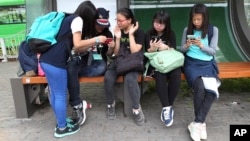On the Korean peninsula, the tense boundary known as the demilitarized zone is not the only thing that separates the North and South. The war seven decades ago also created a division in how Koreans speak their language. And for many newly arrived North Korean defectors in the South, learning new words and expressions makes resettling even more challenging. A new smartphone app could help these refugees overcome the linguistic division.
When some South Koreans hear the way North Koreans speak, they say it sounds old fashioned or even a little strange.
It is not only due to a different accent.
After so many years of division and lack of contact between the two countries, some words and phrases that North Koreans use today went out of style in the South years ago or had their meanings changed. And thanks to globalization in South Korea, there are many new words here that do not exist in the North.
This language barrier causes a sort of culture shock for many of the 28,000 North Korean defectors who now live in the South said Sokeel Park of the refugee support group Liberty in North Korea, LiNK.
“So many of the English words in particular that South Koreans, especially young South Koreans are familiar with, words like win-win, risk, service, these kind of things are just thrown in very casually for South Koreans but North Koreans just have no idea about these words. So this is a language barrier they face,” said Park.
South Korea is a very competitive society and there is concern that if young North Korean defectors cannot keep up with their Southern-born peers, they will wind up as second-class citizens.
That is why Jang Jong-chul of the firm Cheil Worldwide developed a new smartphone app that will help defectors overcome the language gap.
It is called “Univoca,” short for unification vocabulary.
Jang said the app goes beyond what an online translation program can do and is a true South to North Korean translator. He explains his agency worked with a class of teenaged North Korean defectors to identify unknown words and relied on older refugees to come up with the best translations.
Univoca allows a user to type in or take a picture of an unfamiliar word and it gives a North Korean translation. It also gives practical language help, like how to order a pizza. It also explains dating terminology South Koreans use.
Lee Song-ju, 28, defected to South Korea in 2002, but said he remembers how frustrating the language difference was when he first arrived.
He tests Univoca inside a Seoul shopping plaza, starting off with the word South Koreans say for restroom. Lee types the South Korean word, hwajeong shil, into his phone, and gets the correct North Korean equivalent.
But after trying out the app on some other words, he says the results are mixed.
“The range of vocabulary that this app covers, the variety of words is very limited actually,” he said.
Univoca’s developers say they are still adding more words to the app’s open source database.
Nonetheless, Lee said that for North Koreans who just arrived in the South, the app is a good way to learn new vocabulary.
“I support this app, actually. This app is very helpful for North Korean defectors. It’s well-designed, well organized,” he said.
And that helps close the language gap, Lee hopes.
But some observers point out that the North/South language divide is getting a little smaller in part due to North Korea’s black market.
LiNK’s Sokeel Park said contraband South Korean media, like television dramas, that are smuggled into the North are changing the way some people speak there.
“From this, we get an interesting linguistic shift inside North Korea whereby it’s cool to speak with a slight South Korean accent or use words that you can only learn from South Korean dramas,” said Park.
Park said the Pyongyang government probably considers that subversive, but for some young North Koreans, talking like South Koreans is a status symbol.








